Fostering Kittens – Foundation for the Future … or Foster Fail?
June is known as Foster Pet Month and, as a veterinarian and someone who has fostered many orphaned kittens (many pictures to follow, including me in vet school at right – be warned), I wanted to give some insight into what fostering kittens is like and provide some tips for new foster kitten parents.
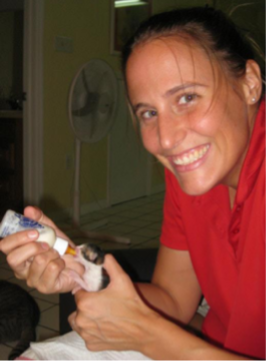
Why do it?
Fostering kittens can offer many benefits to you, your community, and the sweet cats you help support. Fostering offers an opportunity to help vulnerable animals get a better chance at a healthy future, give you and your family a chance to cuddle cute little kittens, and present opportunities for learning about how to care for others (good lessons for kids as they grow), and provides a chance to ‘test drive’ a possible future family pet, also known lovingly as being a “foster fail.”
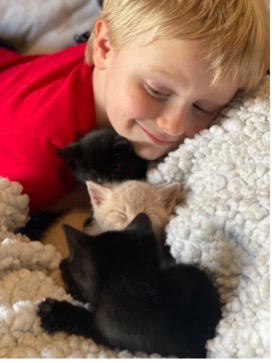
How to get started?
Funnily, when my son was a newborn, many of my veterinary medical skills and kitten-fostering skills came into play as I navigated those first few weeks of having my first baby. When I wasn’t sure, I may have said to myself… ‘ok what would you do with a kitten…” and then proceeded cautiously with whatever new thing I was introducing or attempting for the first time with my child. Having fragile young beings in your hands can be terrifying as you realize how much they truly depend on your help. Being able to provide support to those needy little kittens can also be incredibly rewarding. If you decide to venture into the world of fostering kittens there are some details below to keep in mind that will help you on your fostering journey.
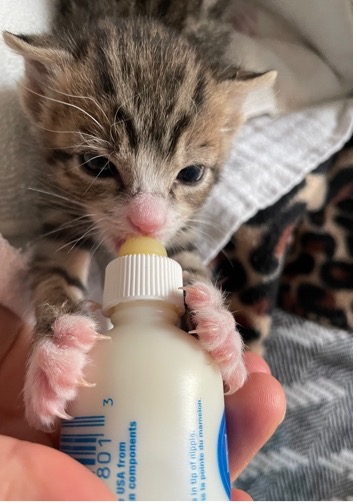
Some kittens may be found with their mom and are usually not as energy intense (on the part of the foster person) because Mom Cat is there to feed and care for those needy little kittens. Since caring for kittens (without Mom’s help) has a few important details, but is tremendously rewarding and “awwwww” inducing, I’ve provided the following helpful information. While not exhaustive, these tips may be useful; however, also remember to reach out to the shelter or rescue facility for resources they may have to help.
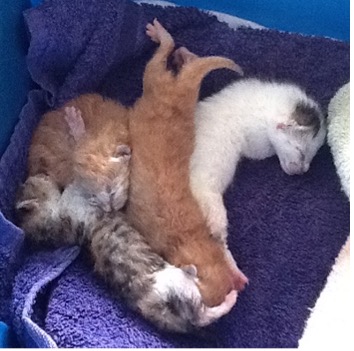
Top tips for caring for orphaned kittens
1. Finding the kittens –Connect with your local humane society or rescue shelter as they regularly have kittens (as well as other ages and animals) that are surrendered to them. They will often be able to provide some supplies (such as food and litter that have often been donated either by individual people or via industry support) to help support caring for the kittens. Often, they will keep a list of potential fosters and reach out as kitten season begins to determine their availability. I usually get calls in the springtime through summer.
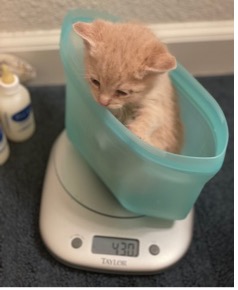
2. Preparing your foster home – Having temporary kittens to care for still requires some preparation of your home. Be sure to have a safe area that will fit their bedding, food, water, and litter box. If, like me, you house your kittens in your bathroom remember to keep toilet lids closed as kittens can often get into, but not out of, open toilets and are at risk of drowning.
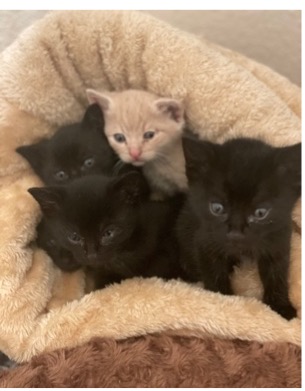
|
Important Supplies/Information for Foster Kitten Parents to Consider |
|
|
Safe space |
Warm, quiet, draft-free, low traffic, fully contained space |
|
Bedding |
Comfy & warm (i.e., towels, fleece). The ability to do laundry - there will be lots! |
|
Bowls/plates for food & water |
Consider stainless steel, glass, or ceramic if possible. Cleaning dishes daily is essential to help maintain health. |
|
Litter box & litter |
Be sure to provide appropriate size (esp. for younger/smaller kittens) and various litter types as needed. |
|
Toys & enrichment |
Remember different types of play are important to encourage. Also, monitor toys to be sure they remain intact, as kittens can also accidentally eat the wrong thing! |
|
Scratching posts |
Ideally, you can offer different types of scratching posts, such as carpet, rope, and cardboard to name a few. |
|
Small kitchen scale |
This can help to monitor the kittens’ weight as they grow (particularly if there are quite a few kittens). Having numbers to compare to previous weights will help you see if they are not gaining weight. Kittens should initially gain ~ 10 g/day. |
|
Food & litter |
Depending on the rescue you are working with they may be able to provide appropriate kitten growth food and litter supplies, so be sure to ask! |
3. Help for the appropriate st(age) of a kitten – Depending on the age of the kitten will determine what type of care the kitten will need. If you are given a 4-day-old kitten, the care involved is significantly different than a 4-week-old or 8-week-old kitten. If unsure, reach out to the shelter/rescue facility for help. Check out the kitten developmental milestones below for a general idea of what to expect with kittens from newborn until almost 2 months of age.
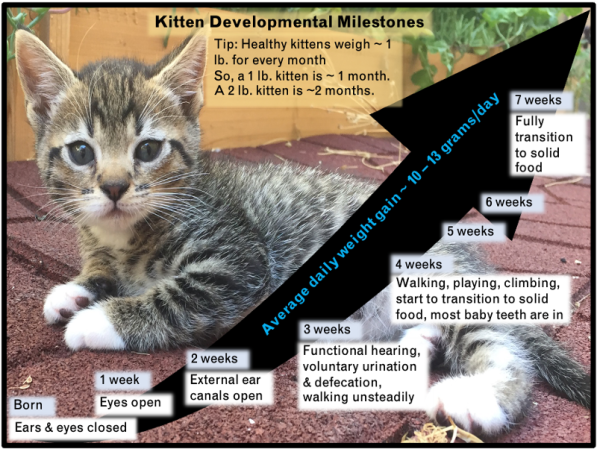
Image of one of my many foster kittens in my backyard & Kitten Developmental Milestones by Dr. Wilson
4. Provide proper nutrition – Always provide fresh water and food appropriate for their age (kitten food or kitten milk supplement). Very young kittens (under 3 weeks) cannot eat solid food & need appropriate kitten milk supplementation. Bottle-fed babies also must be warm before being fed as their digestive system doesn’t work well when their body temperature is too cold. Keeping them warm with blankets, or a special warming disk can ensure they are ready to go at feeding time. Neonates (newborns) also require feedings often (as often as every 2-3 hours at first), so be sure that you can devote the appropriate time to these really young kittens; or ask for kittens that are slightly older and already eating solid food as they don’t need food nearly as often.
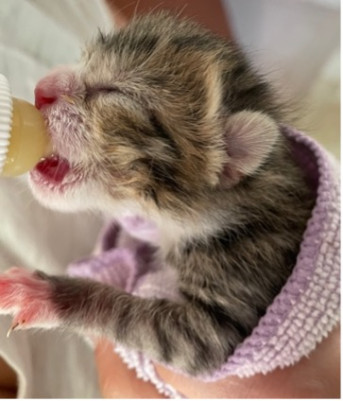
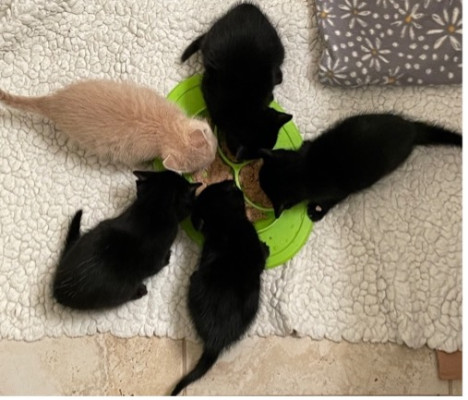
5. Provide proper litter box access and training – Very young kittens cannot go to the bathroom voluntarily and must be stimulated to urinate and defecate. As they age, they should be allowed access to one or more litter boxes with different types of litter to determine their preference. Typically, the preferred type for most cats is unscented gravel-clumping litter, although other litter types may also be used successfully by kittens.
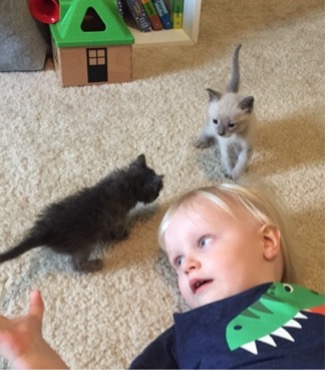
6. Socialization … aka cuddles & handling – This is incredibly important to ensuring kittens grow up to be well-adjusted, lovely cats. It is important that you spend time cuddling, petting, and talking to the kittens gently as well as gradually introducing them to different sounds, smells, and people of different ages, if possible, so they can be comfortable in the future. If socializing kittens with young children, be sure to be there to supervise as young kids can often play a bit harder than they should, as can kittens, and sometimes adults need to step in before inappropriate play escalates.
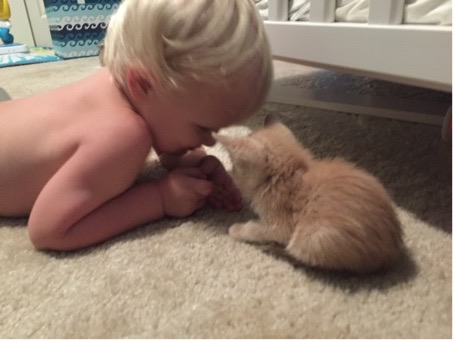
7. Playtime is important too – Creating appropriate time for the kittens to play is important as well. Play allows them to develop the skills they need as adults and figure out their environment as well. Helping cats play appropriately with toys that engage them in different ways helps them learn the cat skills they need. Climbing (trees), scooping (fish), hunting, and chasing (prey) are all types of play or behaviors that cats enjoy engaging in. So finding ways to provide an avenue for growing kittens to do these things will allow them to become their best selves!
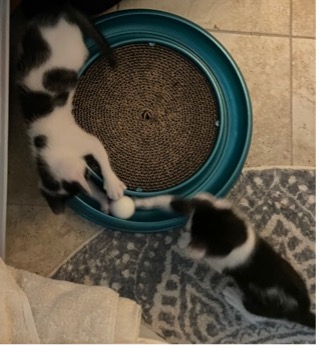
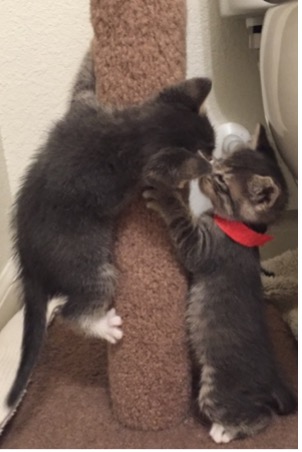
8. Grooming – Keeping foster kittens clean can help keep them healthy as well. Keeping their eyes and face clean, handling their feet, trimming nails, and brushing their fur as young kittens will help them be more habituated with these necessary care actions later in their adopted life.
9. Monitor their health and maintain communication – Keep a close eye on the kitten(s) health and be sure to call the veterinarian or rescue/shelter liaison with questions or concerns. Common emergency situations that should be communicated immediately include; ataxia (weird/drunk walking), low energy, poor appetite, not eating or drinking at all, sudden limping, difficulty with urination or defecation, vomiting or diarrhea, and runny nose/eyes, coughing or sneezing to name a few. If concerned about anything, it is better to reach out with questions. It is essential to growing kittens that their health is maintained, and often orphan babies can come to you looking very sick. They may need medications to ensure they get better and have a chance at a good kitty future. With close monitoring from you, the foster parent, and timely treatment you can turn a sad-looking kitten into a healthy happy little furball. Like the pictures of my kitten Crawford (pictures to the right) when he first came to me as a foster (above) and now that I’ve failed in the best way (below)Crawford in his now permanent home, my home!
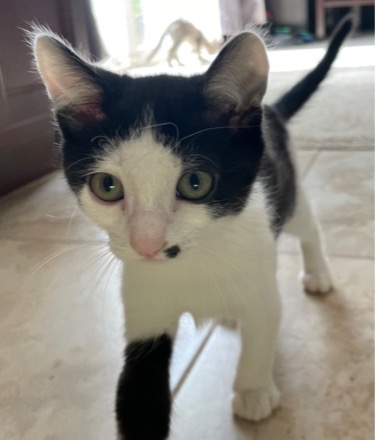
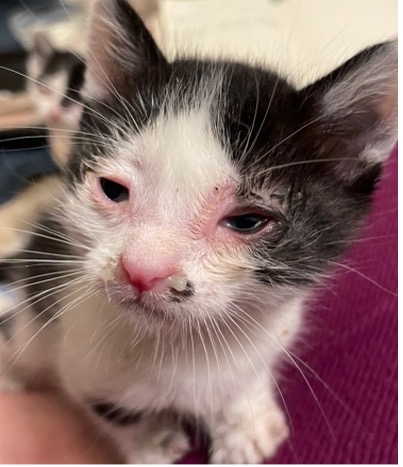
10. Take pictures (& video) – Taking pictures allows you to see how quickly these cute little guys grow, save wonderful memories of the time and care you have provided, and provide pictures to help the shelter/rescue facility find these foster kittens a wonderful future home. To get the great pictures to get down at the kittens’ level for the best up close and adorable kitten face shots that are sure to get them adopted!
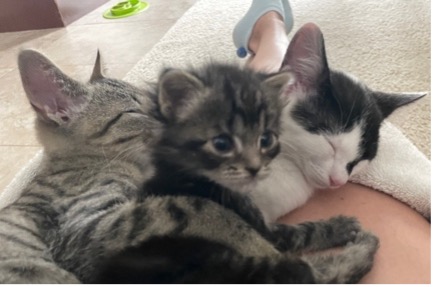
11. Lastly, prepare for goodbyes – This can be the hardest part of any foster experience. When these kittens are old enough and ready for adoption, it’s tough as a foster. You’ve supported them through their most vulnerable time in life, watched them turn into the unique kitten they are; some spunky, some cuddly, some reserved, and some … downright bratty, and now they are ready to go to their forever home. It is hard at this time to say goodbye, but you can comfort yourself knowing you provided them with a wonderful foundation. Sometimes though, you find the kitten(s) that you can’t say goodbye to, and you end up a foster failure like me!
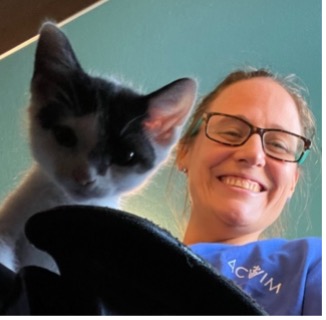
Follow us on LinkedIn for the latest updates on all things happening here at BSM Partners.
About the Author
Dr. Sarah Wilson is a Board Certified Veterinary Nutritionist® and formerly served as Director of Veterinary Nutrition within Nutrition Services at BSM Partners. She has practiced clinical veterinary medicine as well as specialized in veterinary nutrition. In both a clinical setting for individual patients, and as a consultant for the pet food industry, providing appropriate nutritional advice on a small scale (single patient) or on a large scale (industry) allows Dr. Wilson to talk about her favorite things all day long: food and pets!
This content is the property of BSM Partners. Reproduction or retransmission or repurposing of any portion of this content is expressly prohibited without the approval of BSM Partners and is governed by the terms and conditions explained here.